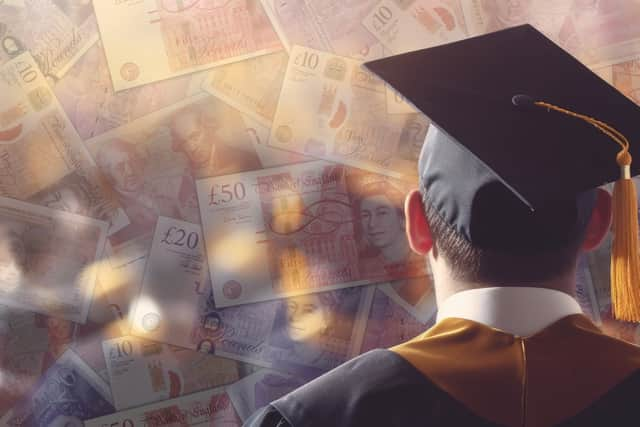Universities: Hundreds of thousands of graduates owed refunds after making ‘incorrect’ student loan repayments
and live on Freeview channel 276
Hundreds of thousands of graduates are owed refunds after making unnecessary student loan repayments, new analysis has found.
Data obtained from a Freedom of Information Request (FOI) to the Student Loans Company (SLC) revealed that a staggering 856,475 university graduates made student loan payments in the 2021/2022 financial year - despite earning below the threshold at which you start paying money back. Of those who made “incorrect” payments for this reason, only 2% have claimed a refund from the SLC.
Advertisement
Hide AdAdvertisement
Hide AdWebsite Save The Student, which secured the figures, also found that 203,064 graduates started repaying their student loans under the wrong plan type - and 39,000 accidentally made early repayments. Meanwhile, a further 52,300 continued to make repayments after they had cleared their balance.
Graduates who continue repaying their loans after clearing the balance are usually automatically issued with a refund or contacted by SLC to arrange one. However, this is not always the case for those who overpay for other reasons - and so Save The Student are urging graduates to check whether they are owed money.
Tom Allingham, Save the Student’s money expert, said: “I’d strongly urge all graduates to check if they’re owed hundreds of pounds in the form of a student loan repayment refund. In the case of graduates repaying their student loans despite earning below the threshold, this tends to be because their salary has varied throughout the year.”


Those who attended universities in England and Wales - and who started a degree in or after September 2012 - currently start repaying their loans back when they earn £27,295 or more a year. These are known as ‘Plan 2’ loans.
Advertisement
Hide AdAdvertisement
Hide AdHowever, under new changes, announced in February 2022, ex-students who started degrees in England in the year 2023/2024 will have to begin repayments once they earn £25,000 or more.
Mr Allingham commented: “If your total earnings at the end of the financial year are still below £27,295, you’re entitled to a refund of any repayments you made. But whatever the reason, if you believe you may have made incorrect student loan repayments, it’s usually worth claiming a refund.”
He added that graduates on ‘Plan 2’ loans should particularly look to do this - as 80% are expected to have some of all of their balance wiped by the government after 30 years. Therefore, “there’s little danger of graduates claiming money back only to repay it again later,” he said.
Commenting on the research, SLC said that the 856,475 “below threshold payments” were not taken by mistake. It explained that student loan repayments are based on annual earnings, with deductions taken each pay period in which earnings are above the threshold - typically weekly or monthly.
Advertisement
Hide AdAdvertisement
Hide AdRefunds can only be issued to those who earn less than the threshold at the financial year-end, as per the regulation. A spokesperson for SLC said: “SLC administers student loan repayments as per the regulations set by the UK and devolved governments.
“Deductions are taken by the employer in every pay period, generally weekly or monthly, when repayer earnings are higher than the threshold for the pay period. If a repayer is having repayments taken too soon, or they are placed on the wrong plan type, they should contact their employer, to correct this error.
“The overwhelming majority of repayments are taken correctly and SLC routinely refunds customers who have over repaid. In the last year, SLC automatically refunded 77,973 customers and will continue to do so on a monthly basis.”
How do I find out if I am owed a refund?
If you have had a deduction in the previous tax year and your earnings are below the annual repayment threshold, you should login to your student loans account - and contact SLC. It is also worth checking if you have already been given a refund. If you are unsure, you can seek advice with Save The Student, your employer, or with SLC.
Comment Guidelines
National World encourages reader discussion on our stories. User feedback, insights and back-and-forth exchanges add a rich layer of context to reporting. Please review our Community Guidelines before commenting.
